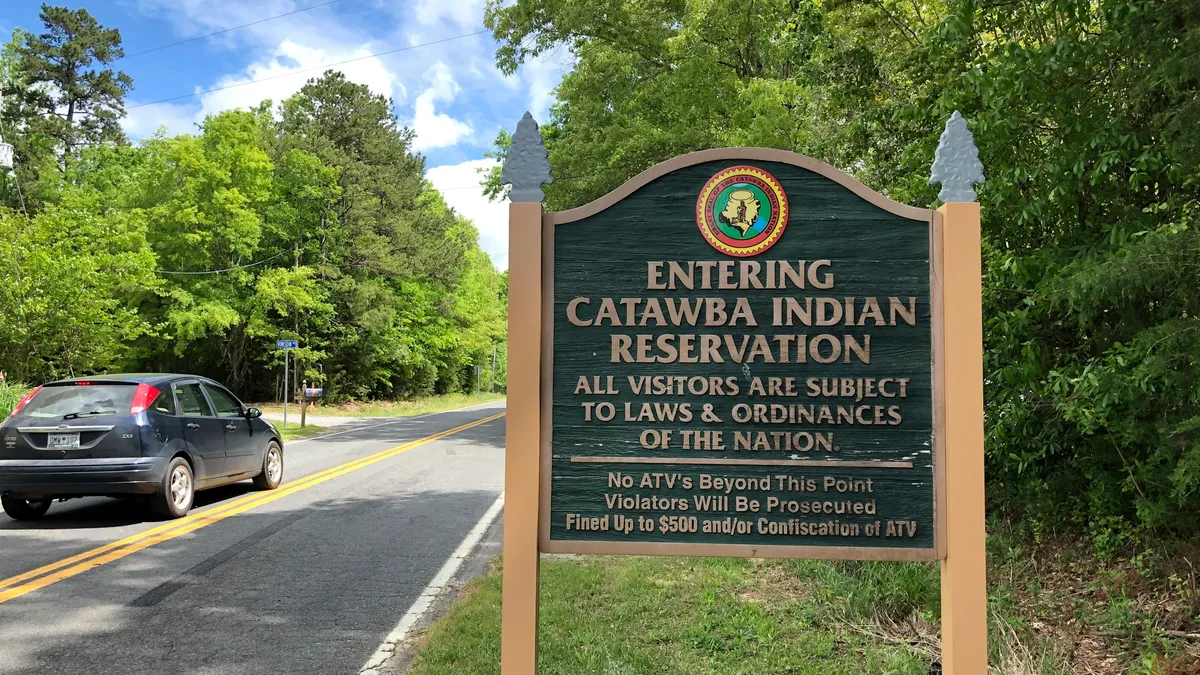The Catawba Indian Nation passed a banking code last month, part of the tribe’s effort to attract traditional and emerging financial activity to its 600-acre reservation in South Carolina.
The project is headed by the Catawba Digital Economic Zone, a legal entity formed in February 2022 to help spur economic development in the area.
“This is an example of a tribe moving beyond simply governing the gaming space, cannabis or payday lending, but being a full-service governing body for businesses in their jurisdiction,” said CDEZ CEO Joe McKinney, who has been spearheading the tribe’s economic development efforts for several years.
By passing the code, the CDEZ hopes to eventually gain regulatory approval for de novo banks to receive charters under the laws of the Catawba reservation’s federally recognized land, he said.
The code is modeled after existing financial codes in South Dakota, North Dakota and Wyoming, states whose financial frameworks demonstrate a commitment to regulating innovative financial activity, McKinney said.
The bulk of the CDEZ’s bank code is mirrored after South Dakota’s, he said.
“One of the best jurisdictions for banking, arguably, in terms of assets under management, is the South Dakota code,” McKinney said.
Wyoming’s embrace of crypto, through its special-purpose depository institutions, and North Dakota’s status as the only state with a government-run bank, also served as inspiration for the Catawba Indian Nation’s bank code, McKinney said.
Under the U.S. Constitution, tribal governments have the same status as states in regards to commercial law and business regulations, McKinney said.
“We can do, basically, everything that a state can do,” McKinney said, arguing the zone’s “more nimble” five-person commission would help it compete with states like Wyoming, South Dakota, North Dakota and even Delaware.
“One of our taglines is ‘disrupt Delaware,’” he said, referencing the state’s unique tax benefits and business-friendly climate that have enticed some of the country’s largest firms to incorporate there.
Like North Dakota’s state-run bank, the CDEZ aims to charter a public bank. The public bank would serve as a regulator for its bank charters and facilitate access to capital for banks and Catawba citizens.
The CDEZ is working on establishing a banking commission, which would be responsible for reviewing charters and conducting bank examinations, McKinney said.
The zone also plans to work with federal bank regulators to make sure it gets services that are available to other state-chartered institutions, such as Federal Deposit Insurance Corp. deposit insurance and federal payment access, McKinney said.
McKinney said he thinks the zone’s bank charters could be an attractive option for both de novo banks and fintechs.
“Maybe some of the high-quality neobanks that have best practices and quality teams, that can pass our vetting through our charter system, could be banks themselves,” he said.
The reservation’s proximity to the nation’s second-largest banking hub could also make it a draw for burgeoning financial firms, McKinney added.
Located in York County, South Carolina, the Catawba Indian Nation is just 30 miles south of Charlotte, North Carolina, home to Bank of America and Truist.
“A lot of partnerships, still, are begotten regionally, or in person. So, it certainly helps,” he said.
More banks needed
“Our goal is to provide best-in-class banking and provide responsible innovation,” McKinney said. “The goal is not to circumvent or to provide an alternative, but to integrate within the existing federal financial system in a way that's built for the 21st century.”
The recent failures of Signature, First Republic and Silicon Valley Bank demonstrate a need for more banking charters, McKinney said.
“We think [the code] actually addresses many of the problems that have led to this moment,” he said.
McKinney pointed to a recent speech by Michelle Bowman, in which the Federal Reserve governor highlighted the decline in bank charters and a reduction in bank branches. The trend, Bowman said, has led to an increase in banking concentration in local markets.
“As a consequence, you have this sort of effect, where if one bank starts to make some bad decision, then that effect is felt throughout the entirety of the banking system,” McKinney said. “The nature of business always leads to the possibility of failures. It's better to have more of these banks around than having these failures concentrated in a few of the largest banks.”






















